| Listing 1 - 10 of 50 | << page >> |
Sort by
|
Book
ISBN: 1281861545 9786611861544 1402086687 1402086679 Year: 2008 Publisher: Dordrecht : Springer,
Abstract | Keywords | Export | Availability | Bookmark
 Loading...
Loading...Choose an application
- Reference Manager
- EndNote
- RefWorks (Direct export to RefWorks)
Gottfried Wilhelm Leibniz was an outstanding contributor to many fields of human knowledge. The historiography of philosophy has tagged him as a “rationalist”. But what does this exactly mean? Is he a “rationalist” in the same sense in Mathematics and Politics, in Physics and Jurisprudence, in Metaphysics and Theology, in Logic and Linguistics, in Technology and Medicine, in Epistemology and Ethics? What are the most significant features of his “rationalism”, whatever it is? For the first time an outstanding group of Leibniz researchers, some acknowledged as leading scholars, others in the beginning of a promising career, who specialize in the most significant areas of Leibniz’s contributions to human thought and action, were requested to spell out the nature of his rationalism in each of these areas, with a view to provide a comprehensive picture of what it amounts to, both in its general drive and in its specific features and eventual inner tensions. The chapters of the book are the result of intense discussion in the course of an international conference focused on the title question of this book, and were selected in view of their contribution to this topic. They are clustered in thematically organized parts. No effort has been made to hide the controversies underlying the different interpretations of Leibniz’s “rationalism” – in each particular domain and as a whole. On the contrary, the editor firmly believes that only through a variety of conflicting interpretive perspectives can the multi-faceted nature of an oeuvre of such a magnitude and variety as Leibniz’s be brought to light and understood as it deserves.
Rationalism. --- Leibniz, Gottfried Wilhelm, --- Philosophy. --- History. --- Ethics. --- Modern philosophy. --- Political science. --- Religion --- Modern Philosophy. --- History of Science. --- Philosophy of Law. --- Philosophy of Religion. --- Administration --- Civil government --- Commonwealth, The --- Government --- Political theory --- Political thought --- Politics --- Science, Political --- Social sciences --- State, The --- Modern philosophy --- Deontology --- Ethics, Primitive --- Ethology --- Moral philosophy --- Morality --- Morals --- Philosophy, Moral --- Science, Moral --- Philosophy --- Values --- Annals --- Auxiliary sciences of history --- Mental philosophy --- Humanities --- Knowledge, Theory of --- Belief and doubt --- Deism --- Free thought --- Realism --- Leibnitz, Gottfried Wilhelm --- Leibniz, Gottfried Wilhelm --- Philosophy, modern. --- Philosophy of law. --- Religion—Philosophy. --- Philosophy, Modern. --- Science --- Law --- Early Modern Philosophy. --- Moral Philosophy and Applied Ethics. --- Jurisprudence
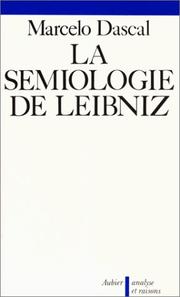
ISBN: 2700701143 9782700701142 Year: 1978 Volume: 26 Publisher: Paris: Aubier,
Abstract | Keywords | Export | Availability | Bookmark
 Loading...
Loading...Choose an application
- Reference Manager
- EndNote
- RefWorks (Direct export to RefWorks)
Semiotics --- Leibniz, von, Gottfried W. --- Leibniz, Gottfried Wilhelm, --- Semeiotics --- Semiology (Linguistics) --- Semantics --- Signs and symbols --- Structuralism (Literary analysis) --- Leibniz, Gottfried wilhelm Freiherr von --- -Contributions in concept of subjectivity --- -Congresses --- Semiotics. --- Leibnitz, Gottfried Wilhelm --- Leibniz, Gottfried Wilhelm --- Leibniz, Wilhelm Gottfried --- Leibniz, Gottfried Wilhelm, - Freiherr von, - 1646-1716
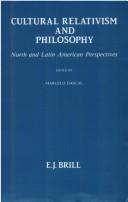
ISBN: 9004094334 9004451617 9789004094338 9789004451612 Year: 1991 Volume: 7 Publisher: Leiden: Brill,
Abstract | Keywords | Export | Availability | Bookmark
 Loading...
Loading...Choose an application
- Reference Manager
- EndNote
- RefWorks (Direct export to RefWorks)
In spite, or perhaps because of, the ongoing cultural, economic, and political uniformization of the world, relativism has risen to the top of the agenda of philosophy and other disciplines. To what extent does cultural diversity affect the activity and the products of philosophizing and of social science? Can there be convergence of worldviews and conceptual frameworks across cultural boundaries? Can there be mutual understanding across them in spite of diversity? These and other questions prompted by the recent upsurge of relativism are tackled in original essays by philosophers and social scientists. The special focus and interest of the book lies in its attempt to confront North and Latin American perspectives on these issues. The four parts of the book ( Relativism: transformation or death? A glimpse of variety: Philosophical experiences and worldviews in Latin America; Nature, Culture and Art ; and Crossing conceptual frameworks ) discuss different, though intertwined, aspects of the challenge of relativism.
Cultural relativism --- Ethnocentrism --- Ethnocentrisme --- Philosophy --- -Ethnocentrism --- -130.2 --- Ethnopsychology --- Nationalism --- Prejudices --- Race --- Relativism, Cultural --- Ethnology --- Relativity --- Filosofie van de cultuur. Cultuurfilosofie. Cultuursystemen. Kultuurfilosofie --- 130.2 Filosofie van de cultuur. Cultuurfilosofie. Cultuursystemen. Kultuurfilosofie --- 130.2 --- Latin America --- North America --- Ethnocentrism - North America --- Ethnocentrism - Latin America --- Cultural relativism - Philosophy
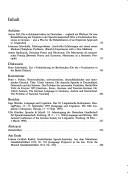
ISBN: 3110095831 311013991X 9786612195914 1282195913 3110203294 1282196022 9786612196027 3110203405 9783110203400 9783110095838 Year: 1996 Volume: 7 Publisher: Berlin: de Gruyter,
Abstract | Keywords | Export | Availability | Bookmark
 Loading...
Loading...Choose an application
- Reference Manager
- EndNote
- RefWorks (Direct export to RefWorks)
This series of HANDBOOKS OF LINGUISTICS AND COMMUNICATION SCIENCE is designed to illuminate a field which not only includes general linguistics and the study of linguistics as applied to specific languages, but also covers those more recent areas which have developed from the increasing body of research into the manifold forms of communicative action and interaction.For ""classic"" linguistics there appears to be a need for a review of the state of the art which will provide a reference base for the rapid advances in research undertaken from a variety of theoretical standpoints, while in the m
Language and languages --- Philosophy. --- -800.1 Taalfilosofie --- 800.1 --- -Foreign languages --- Languages --- 800.1 Taalfilosofie --- Taalfilosofie --- Philosophy --- Foreign languages --- Anthropology --- Communication --- Ethnology --- Information theory --- Meaning (Psychology) --- Philology --- Linguistics --- Philosophy of language --- Linguistics. --- Langage et langues --- Philosophie --- Linguistic science --- Science of language --- Language and languages - Philosophy --- -Philosophy

ISBN: 1588114147 9027226040 9786612160714 1282160710 9027295891 9781588114143 9789027226044 9789027295897 Year: 2003 Publisher: Amsterdam: Benjamins,
Abstract | Keywords | Export | Availability | Bookmark
 Loading...
Loading...Choose an application
- Reference Manager
- EndNote
- RefWorks (Direct export to RefWorks)
Our species has been hunting for meaning ever since we departed from our cousins in the evolutionary tree. We developed sophisticated forms of communication. Yet, as much as they can convey meaning and foster understanding, they can also hide meaning and prevent comprehension. Indeed, we can never be sure that a "yes" conveys assent or that a smile reveals pleasure. In order to ascertain what communicative behavior "means", we have to go through an elaborate cognitive process of interpretation.This book deals with how we achieve the daily miracle of understanding each other. Based on the author 's contributions to pragmatics, the book articulates his perspective using the insights of linguistics, the philosophy of language and rhetoric, and confronting alternatives to it. Theory formation is shaped by application to fields of human activity - such as legal practice, artificial intelligence, psychoanalysis, the media, literature, aesthetics, ethics and politics - where interpretation and understanding are paramount. Using an accessible language, this is a book addressed to specialists as well as to anyone interested in interpreting understanding and understanding the potentialities and limits of interpretation.
Pragmatics. --- Communication. --- Comprehension. --- Begrijpen --- Communicatie --- Communication --- Communication [Primitive ] --- Communication humaine --- Comprehension --- Mass communication --- Pragmatics --- Pragmatiek --- Pragmatique --- Understanding --- Lexicology. Semantics --- Compréhension --- Apperception --- Learning, Psychology of --- Memory --- Communication, Primitive --- Sociology --- Pragmalinguistics --- General semantics --- Language and languages --- Logic, Symbolic and mathematical --- Semantics (Philosophy) --- Philosophy
Book
ISBN: 1402081901 9786611378011 1281378011 Year: 2007 Publisher: Dordrecht : Springer,
Abstract | Keywords | Export | Availability | Bookmark
 Loading...
Loading...Choose an application
- Reference Manager
- EndNote
- RefWorks (Direct export to RefWorks)
Leibniz is known mainly as a logician and mathematician, and as the creator of a fascinating but strange metaphysical system. In these, as well as in other fields, his remarkable innovations were achieved by painstaking efforts to establish a fruitful critical dialogue with the leading contemporary thinkers.
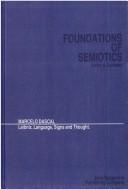
ISBN: 9027232806 9786613328472 128332847X 9027278997 9789027278999 9789027232809 Year: 1987 Publisher: Amsterdam
Abstract | Keywords | Export | Availability | Bookmark
 Loading...
Loading...Choose an application
- Reference Manager
- EndNote
- RefWorks (Direct export to RefWorks)
Why was Leibniz so deeply interested in signs and language? What role does this interest play in his philosophical system? In the essays here collected, Marcello Dascal attempts to tackle these questions from different angles. They bring to light aspects of Leibniz's work on these and related issues which have been so far neglected. As a rule they take as their starting point Leibniz's early writings (some unpublished, some only available in Latin) on characters and cognition, on definition, on truth, on memory, on grammar, on the specific problems of religious discourse, and so on. An effort
Philosophy of language --- Semiotics --- Leibniz, von, Gottfried W. --- Linguistics --- Thought and thinking --- Mind --- Thinking --- Thoughts --- Educational psychology --- Philosophy --- Psychology --- Intellect --- Logic --- Perception --- Psycholinguistics --- Self --- Semeiotics --- Semiology (Linguistics) --- Semantics --- Signs and symbols --- Structuralism (Literary analysis) --- Linguistic science --- Science of language --- Language and languages --- Leibniz, Gottfried wilhelm Freiherr von --- -Contributions in concept of subjectivity --- -Congresses --- Leibniz, Gottfried Wilhelm, --- Leibnitz, Gottfried Wilhelm --- Leibniz, Gottfried Wilhelm --- Semiotics. --- Linguistics. --- Thought and thinking.
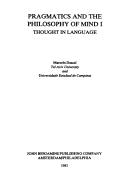
ISBN: 1283359510 9786613359513 9027280371 9789027280374 9027225036 9789027225030 9781283359511 6613359513 Year: 1983 Volume: IV:1 Publisher: Amsterdam Philadelphia Benjamins
Abstract | Keywords | Export | Availability | Bookmark
 Loading...
Loading...Choose an application
- Reference Manager
- EndNote
- RefWorks (Direct export to RefWorks)
This volume deals with the relation between pragmatics and the philosophy of mind. Unlike most of the books written on the subject, it does not defend the view that a specific form of dependence holds between language and thought, to the exclusion of all other possible relations. Taking pragmatics in its original sense of "that part of semiotics that is concerned with the users of a semiotic system", the book analyses the nature of the mental processes and states mirrored in language use. Drawing on results from cognitive psychology, the philosophy of mind, the philosophy of language, l
Language and languages --- Psycholinguistics. --- Thought and thinking. --- Pragmatics. --- Mind --- Thinking --- Thoughts --- Educational psychology --- Philosophy --- Psychology --- Intellect --- Logic --- Perception --- Psycholinguistics --- Self --- Language, Psychology of --- Psychology of language --- Speech --- Linguistics --- Thought and thinking --- Pragmalinguistics --- General semantics --- Logic, Symbolic and mathematical --- Semantics (Philosophy) --- Philosophy. --- Psychological aspects --- 800.1 --- 800.1 Taalfilosofie --- Taalfilosofie --- Philosophical anthropology --- Pragmatics --- Philosophy of language --- Langage et langues --- Psycholinguistique --- Pensée --- Pragmatique --- Philosophie --- Taal/ en denken. --- Taal. Psychologie. --- Pragmatique. --- Langage. Psychologie. --- Langage et pensée --- Pragmatiek.
Periodical
Publisher: Amsterdam: Benjamins,
Abstract | Keywords | Export | Availability | Bookmark
 Loading...
Loading...Choose an application
- Reference Manager
- EndNote
- RefWorks (Direct export to RefWorks)
Multi
ISBN: 9781402052286 Year: 2006 Publisher: Dordrecht Springer Science+Business Media B.V
Abstract | Keywords | Export | Availability | Bookmark
 Loading...
Loading...Choose an application
- Reference Manager
- EndNote
- RefWorks (Direct export to RefWorks)
Leibniz is known to the wide public and to many scholars mainly as a logician and mathematician, and as the creator of a fascinating but strange metaphysical system. In these, as well as in other fields, his remarkable innovations were achieved through painstaking efforts to establish a fruitful critical dialogue with the leading contemporary thinkers. He was no less important, however, in his practical endeavor to bring opponents to negotiate reasonable solutions to key political and religious conflicts of his time. Both his theoretical and practical activities were informed by a philosophical mind that sought in all circumstances the most general underlying principles; by a juridical mind that sought to bring order and structure to human interaction, without sacrificing the necessary flexibility; by an argumentative mind that knows that persuading is often more important than proving; by a scientific mind eager to organize past and present knowledge so as not to miss any bit of information capable of pointing the way to new discoveries; by a theologian mind that refuses to admit that religious conflicts between true believers are irresolvable; and by an ethical and political mind whose major concern is to direct all our intellectual work towards improving the well-being of humankind. All these perspectives (and more) are united in what this book identifies as his Art of Controversies, which might also be called an Art of Dialectical Cooperation. For it is based on the idea that knowledge production, acquisition, and evolution is not a one-man affair, but the result of the cooperation of many, coming from different perspectives; whence it follows that not only tolerance vis-à-vis the other, but also valuing the other's contribution and integrating it - whether it stems from another age, continent, culture, discipline, religion, or individual - is indispensable. This dialectical Leibniz that emerges from the selected texts here translated, commented, and interpreted in the light of their context, isn't for sure the familiar one. Yet, perhaps surprisingly, it is capable of shedding light on that old, familiar, yet incomplete image of Leibniz, and of adding thus a further reason for cherishing and cultivating the heritage of a truly great man.
History of philosophy --- Religious studies --- Social sciences (general) --- Legal theory and methods. Philosophy of law --- Linguistics --- filosofie --- geschiedenis --- sociale wetenschappen --- recht --- linguïstiek --- godsdienstfilosofie
| Listing 1 - 10 of 50 | << page >> |
Sort by
|

 Search
Search Feedback
Feedback About UniCat
About UniCat  Help
Help News
News